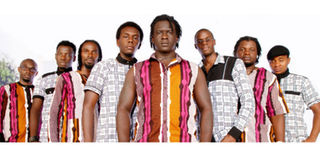Ssewakiryanga’s musical journey with Janzi Band

James Ssewakiryanga (C) with the rest of the Janzi Band members. Photo by Edgar R. Batte.
While in Europe during one of his visits, James Ssewakiryanga met some men in a music store with whom he had a chat.
When he told them he was an artiste from Uganda, they asked him about his musicality. He told them he played adungu (harp). They could only identify the instrument as a kora.
Asked about the type of music Ugandans play, Ssewakiryanga felt embarrassed after failing to explain a particular Ugandan style. He felt challenged and hurt for his country and on his return, he felt he needed to do something.
He also realised that as Ugandan musicians, they were easily recognised at home but not that much beyond our borders.
“I did not know how it would go or how it would turn out but I needed to do something about the situation,” he recalls.
The birth of Janzi Band
Back home in 2009, Ssenkabirwa teamed with Jackson Kirya, a South Africa-based saxophonist, who was playing with Qwela Band, at the time, Steven Oundo, a former Tusker Project Fame contestant, now based in the US, and Abraham Ssekasi to form Janzi Band.
The band had its first gig on August 27 that same year, at Iguana Bar in Kololo, an upscale Kampala suburb.
But Ssekiryanga needed more than four musicians for the band’s first show because Iguana Bar had a big audience. He hired some musicians from Qwela Band.
The show was a success because the band’s sound was something new to the audience.
“That very night, Janzi got booked to play at a wedding ceremony,” he recalls.
Iguana Bar also signed on the band to play at the place every last Thursday of the month. They became the second band to play at the Kisementi-based hangout after The Blood Brothers. Before long, Sheraton Kampala Hotel also booked them to play there on a weekly basis.
“Our music is more about our stories. Some of them are childhood stories that we modify. Many times when we play our music, it is not strange. Someone has an idea of what we are singing about,” Ssewakiryanga, the band leader, explains.
They have since recorded songs such as Eka and Njabala.
However, in 2010, Ssewakiryanga had to travel again and the band realised a problem of continuity from the people that were giving it business.
“I am not sure what happened then, because when I travelled, the band was supposed to keep playing. I was told that it was no longer the Janzi they knew so it was put on hold,” he recounts.
When he returned, it was almost back to scratch. “I had to look for new members because some members had left for personal projects. Oundo had left for the US, Kirya had gone back to South Africa, where he had a family, guitarists Bright Buko and Ronnie Mutebi had left,” he reveals.
The band members
Today, the band comprises eight members, including James Ssewakiryanga (band leader/founder/vocalist), Abraham Ssekasi (guitarist, harp player and percussionist), Trevor Muhumuza (music director and keyboard player), Valeur Kalinda (drummer), Brian Gideon (lead vocalist and guitarist), Allan Okia (bass guitarist/music producer), Joseph Kizito (saxophonist) and Hakim Kiwanuka (percussionist).
Uniquely, it is an all-male band. Ssewakiryanga explains why.
“I would not say that I do not like ladies. I like them because they have got something special. They give you an audience because we know some men go to watch bands because of the ladies. We had them but at some point, we had some disagreements on how I wanted the band to operate.”
He adds that the problem is that ladies want too much attention and for Ssewakiryanga, the band takes precedence over members.
“People have criticised me for having an all-male band and I have always asked them if it is by law that every band has to have ladies. UB40 stood for years and they never had a woman.
It worked for them. Why do Ugandans think we cannot do it?
It is hard to take music away from Ssewakiryanga.
He hails from a musical family. He is a son of James Ssewakiryanga (RIP), former director of Bebifanana Abifuna, a musical group. He is the only son in a family of five children.
“But I would not say my father taught me music. It was my mother instead. She is a traditional dancer. She taught me the xylophone. She was always there to pass onto me whatever musical skill she knew,” he recollects. He was young.
That premised his love for music, a dream that he realised as a solo artiste and with his band- Janzi. He has also worked with Jazz maestro Isaiah Katumwa.
Ssewakiryanga thinks Uganda has lost its music identity. “I do not even understand the music we are doing. We think about a beat but not the message we are putting out there. You will not compare us as a country with the likes of South Africa or Jamaica, whose music can immediately be identified,” he argues.
He takes a swipe at corporate companies, which he accuses of misleading the young generation into believing that Western music is better than ours by heavily sponsoring Western artistes at the expense of the local ones.
About the band
The name: Janzi is a name they got from the local name of a grasshopper. Ssewakiryanga explains that they chose the name because they wanted their music to fly around the world.
Where they play: The band plays at Zone 7 in Mbuya, Kampala every Wednesday.
They also play at Pyramids on Yusuf Lule Road, Kampala on the first and third Friday of the month.
The band also headlines at Mosa Courts in Nakasero, Kampala, every second and fourth Friday of the month.




